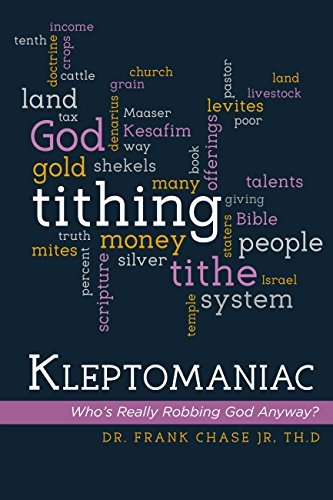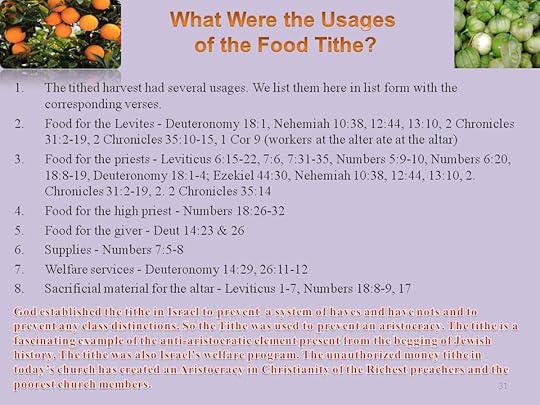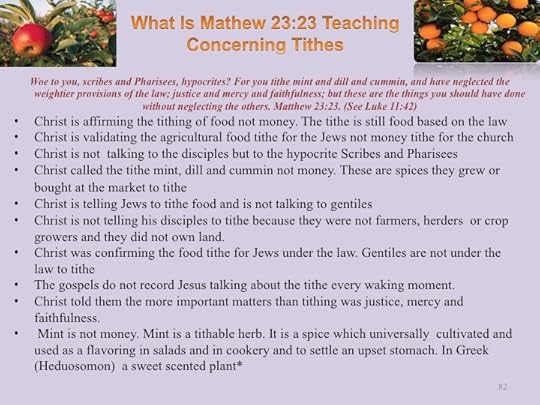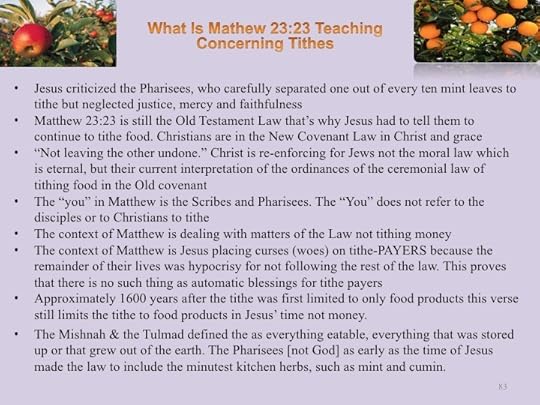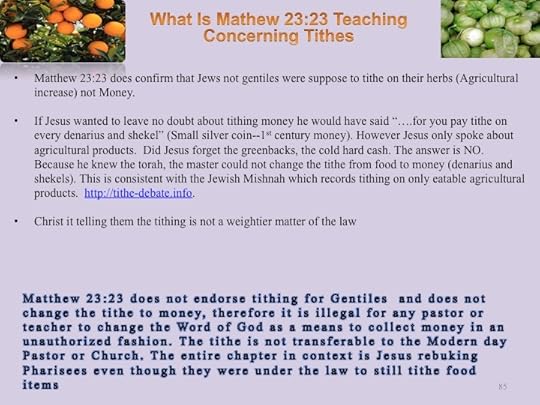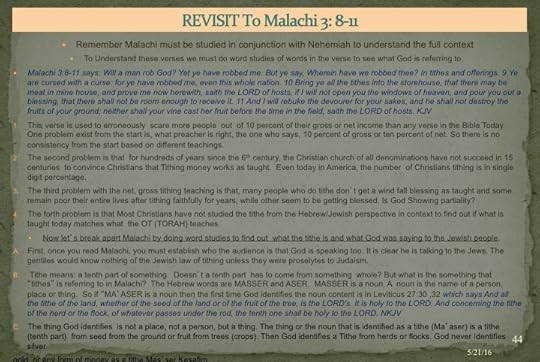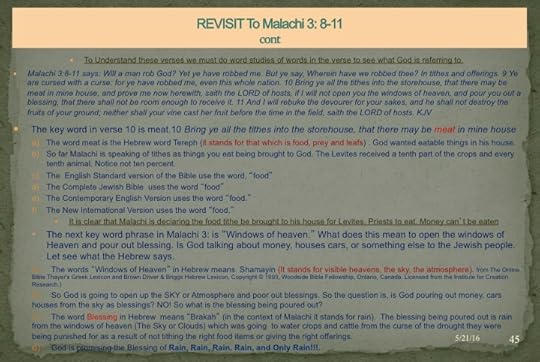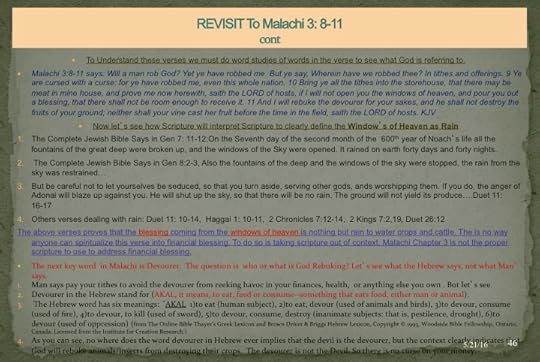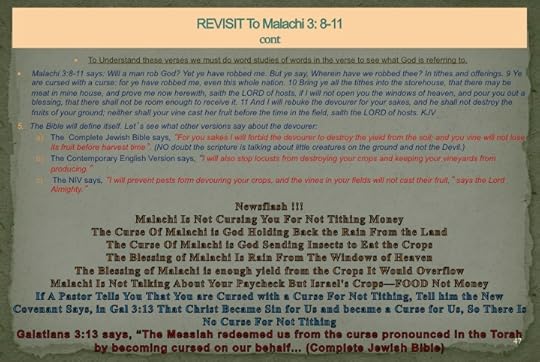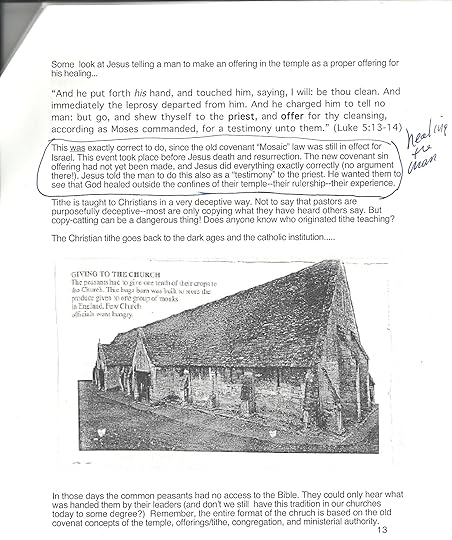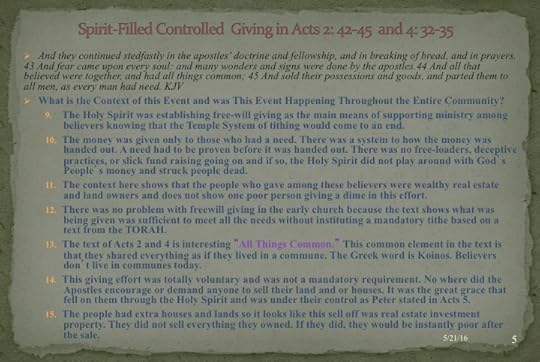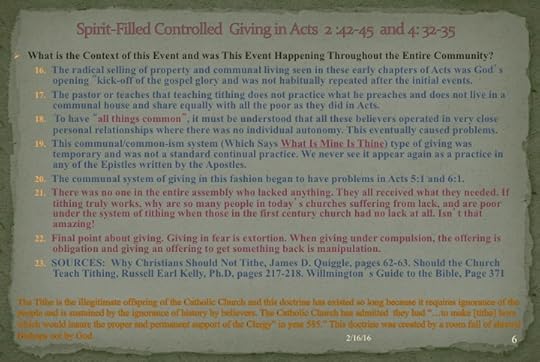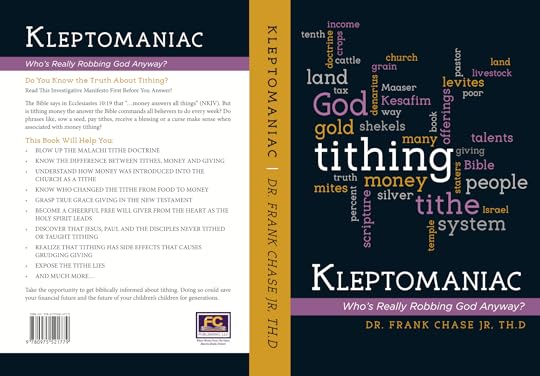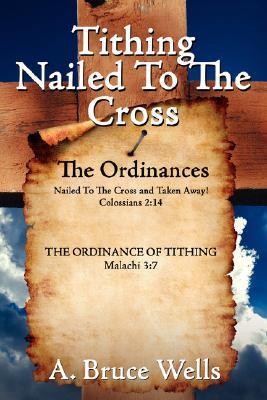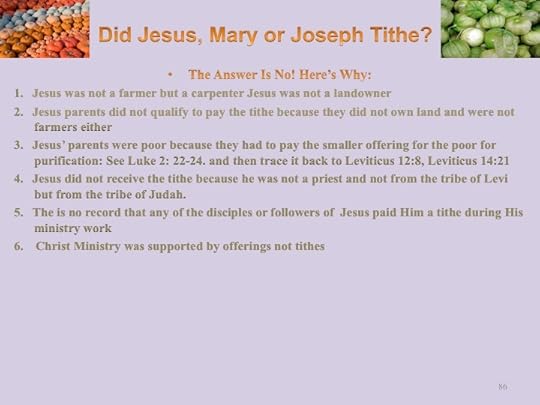Frank Chase Jr.'s Blog, page 5
August 6, 2016
Tithing Study Part 40 Amazing Untruths About Tithing
In my previous post, we continued answering questions from the pamphlet titled, In God We Trust? Amazing Fact tithing pamphlet. In this post, I will continue to break down the erroneous questions and give you what the Bible really says about tithing. We will start with question 12, which is a loaded question that assumes tithing as practiced today is a foregone conclusion, but the opposite is true. Tithing today has no resemblance in form, fit and function to the tithe of the Bible. My book, Kleptomaniac: Who’s Really Robbing God Anyway? has many more answers to the questions this pamphlet provides.
Question 12 reads: In addition to the tithe, which belongs to God, what else does God ask of his people? The pamphlet cites Psalm 96:8, which reads, “Bring an offering and come into His Courts.” Then the answer the pamphlet gives is this: The Lord asks up to give offerings of His work as an expression of our love for him and our thanksgiving for his blessings.
My Answer: The first part of the question is incorrect because it assumes the tithe is money and because of that we are to bring some additional besides the tithe. In fact, God does not ask New Testament believers to tithe crops and cattle and assuming money is a tithe is simply out of context with scripture. Though the verse seems to ask for offerings, it is speaking of the temple, not the New Testament Ekklesia. An offering is not something that’s in addition to tithing, an offering in the New Covenant comes from the heart. It is false scripture twisting to say that an offering is only accepted after you have paid your tithe. There is not Bible verse to back up such an outlandish unbiblical statement. The standard of giving for the followers of the Messiah is free will generous giving that comes from the heart a person who has it to give. Here is what the Bible says to those who are givers. “For if there be first willing mind, it is accepted according to that a man hath and not according to that he hath not” ( 1 Cor. 8:12 KJV). Then Paul went on to say that all giving be on the basis of “every man according as he purposeth in his heart, so let him give; not grudgingly or of necessity, for God loveth a cheerful giver” (2 Cor 9:7). There is no such phenomenon that offerings are given in addition to the tithe.
Question 13 reads: How much shall I give to God as offerings? The pamphlet cites 2 Cor 9:7 and gives this answer: The Bible does not specify a set amount for offerings. Each person decides (as God impresses) how much to give and then gives it cheerfully.
My Answer: For question 13, we, in fact, have a correct answer. All giving comes from a cheerful heart. My answer to question 12 answers question 13. There is no such thing as New Covenant or New Testament tithing.
Question 14 asks, What additional Bible principles does God share with us regarding giving? The amazing facts pamphlet gives a list of answers:
A. My first priority should be to give myself to the Lord (2 Cor. 8:5)
B. I should Give God my very best (Proverbs 3:9).
C. God Blesses the generous Giver (Proverbs 11:24, 25)
D. It is more Blessed to give than to receive (Acts 20:35).
E. When stingy, I am not rightly using my God-given blessing (Luke12:16-21)
F. God returns more than I give (Luke 6:38).
G. I should give in proportion to how God has prospered and blessed me (1 Cor. 16:2).
H. I should give as I am able (Deut 16:17).
After listing all these scripture references, the Pamphlet then states, we return the tithe to God, to whom it already belongs. We give offerings. Offerings are voluntary and should be given Joyously.
My answer: The common practice of stringing together scriptures to prove a point is often used to prove tithing. So the pamphlet asks a question then gives a list of scripture answers on giving then finalizes it by saying we return the tithe to God and give voluntary offerings. The problem with the list of these verses is that each verse has a specific context, which the pamphlet leaves out. None the references address how regular giving was done in the New Testament Church in the first century. Actually, neither Paul or the New Testament address specific giving principles that was common in the first century among the community of believers. On many occasions, Paul addressed giving with reference to helping poor believers who were in some struggle. The New Testament does not really address weekly giving practices and what giving principles should be followed. Many of our giving scenarios and practices are based on current cultural practices and the influences of the IRS as it pertains to charitable giving under the guidance of the 501c3 tax code and the laws of the Old Testament. None of these verses in letters A-H addresses regular giving, but they are used out of context to buttress the tithing argument through the process of homiletics where one uses verses with a similar subject to bolster a larger doctrinal position even though the verse themselves have no direct correlation to each other. You must also keep in mind that a principle is not a command to do something. We are charged to obey commandments, not principles because a principle is not a commandment. The unspoken argument of all of these verses is that money is the driving force behind each verse. I would study each one of the scripture references separately and in context to find out what the real message is, and I guarantee that it won’t be about money for the church.
August 1, 2016
Kleptomaniac book blog
July 16, 2016
Book Review: Kleptomaniac – Who’s Really Robbing God Anyway? by Frank Chase Jr
KLEPTOMANIAC, Who’s Really Robbing God Anyway is a trek through the pages of the Bible to find the untwisted truth about the centuries-old teachings on tithes and offerings. Every page of this book has information that will make you become an …
Source: Book Review: Kleptomaniac – Who’s Really Robbing God Anyway? by Frank Chase Jr
July 8, 2016
Review: Kleptomaniac: Who’s Really Robbing God Anyway?

Kleptomaniac: Who’s Really Robbing God Anyway? by Frank Chase Jr
My rating: 5 of 5 stars
The book is very insightful and informative about the history of tithing and giving in the Church. The book is a fascinating journey into the land, language and literature of the Israelite people and their tithing practices. The author meticulously examines tithe verses and brings to light their meaning using the Hebrew and Greek language. Even if one does not agree with his analysis, it would be difficult to dismiss what the author’s findings reveal. If a person seeks to gain a real understanding and education about tithing and its original meaning, this book is a good place to begin your theological research journey. They say knowledge is power and this book certainly contains a lot of knowledge. Get a copy at http://www.fcpublishing.com/about_kle….
July 5, 2016
Tithing Study Part 38 Amazing Untruths About the Tithe (Part 2)
In my last post, I mentioned that an associate gave me a pamphlet of 22 tithing questions. After reading the entire pamphlet of pro-tithing answers, I decided to provide amazing tithing truths to correctly answers the questions, even though some them were loaded in the way the questions were constructed. In this post, I will with the next five questions by giving you the pamphlet response to questions 6-10 and then respond with the Biblical answer to the questions based on hermeneutics and exegesis. We will start with question six.
Question 6: But didn’t Jesus Abolish the plan of tithing? The pamphlet cites Matthew 23:23: “Woe to you, scribes and Pharisees, hypocrites! For you pay tithe of mint and anise and cummin, and have neglected the weightier matters of the law: justice and mercy and faith. These you ought to have done, without leaving the others undone.” The answer from the Amazing Facts pamphlet says, “No! On the contrary, He (Jesus) endorsed it (tithing). Jesus was rebuking the Jews for omitting the more important matters of the law–justice and mercy and faith–even though they were meticulous tithers. He (Jesus) then plainly told them they should continue tithing, but should also be just and merciful and faithful.”
My Answer: On the surface, the pamphlet answer would lead one to believe that the pro-tithing argument is an open and shut case because Jesus said you must tithe but also show mercy, justice, and faith. However, there is a problem because the pamphlet question assumes tithing is money. If you look at the context of the verse, the Pharisees were not tithing money, they were tithing spices according to the strict specifications of the law. The tithed items were mint, anise, and cummin that came from their household gardens. In fact, Jesus said was rebuking them in the verse and not commending them at all for the meticulous tithing of spices. If you examine the tithe laws, Jesus was endorsing the food tithe laws, not money tithing. For money to be assumed in Matthew 23:23, you have to explain why Jesus left out money from the list of mint, anise, and cummin. Jesus was specific in calling out eatable items because he knew the law and that the law defined the tithe as crops and livestock. For Jesus to endorse money as a tithe would, he would have violated the law and caused the Pharisees to sin. In the verse, the weightier matters of the law were justice, mercy, and faith, and tithing spices from your garden was a lesser matter of the law. Therefore tithing is the law and because it was, Matthew’s Gospel speaks to the Jews under the laws of the Old Covenant. So the answer to question 6 is, no. Jesus did not abolish the food tithe laws, and He never commanded the Pharisees or Gentiles to tithe a tenth part of their pay as a tithe. Because Matthew is under the dispensation of the Old Covenant of the law of Moses and because the age of New Testament/Covenant grace was not instituted yet, Jesus would not suggest abandoning the crop and livestock tithe under the law. Under grace, the answer to the question is yes tithing is abolished because it was always inextricably connected to the Jerusalem temple, the Levites, and the priests for the sacrificial system. There are no more Levites and priests from the tribe of Levi who had the commandment to receives tithes and the Jerusalem temple was destroyed in 70 AD. When the New Covenant came along in the book of acts, freewill giving from the heart motivated by love became God’s preferred method of giving based and Paul backs this up when he said, So let each one give as he purposes in his heart, not grudgingly or of necessity; for God loves a cheerful giver (2 Cor. 9:7) and it was also important that Paul made sure all giving was done with a sense of responsibility and willingness because he also said, For if there is first a willing mind, it is accepted according to what one has, and not according to what he does not have (2 Cor. 8:12). Paul taught giving without percentage because he knew the tithe laws were for Israel so he established giving from heart-based on Old Testament scriptures that addressed giving from the heart. For example, read Duet. 15:7-11.
Question 7: The pamphlet question asks, For what was the tithe used for in Old Testament days? The scripture reference Amazing Facts cites is, “Behold, I have given the children of Levi all the tithes in Israel as an inheritance in return for the work which they perform, the work of the tabernacle of meeting.” The pamphlet answers the questions this way, The tithe in Old Testament days, was used for income of the priests. The tribe of Levi (the priests) received no portion of land for crop growing and business operations, while the other 11 tribes did. The Levites worked full time taking care of the temple and ministering to God’s people. So God’s plan was that the tithe support the priests and their families.
My Answer: Question 7 is filled with a mixture of error and truth because the context is not taken into consideration in the convoluted answer. Taking scripture out of context is always a pretext for false doctrinal error and misinterpretation. The pamphlet says tithing belonged to the priests as income. The pamphlet is incorrect because the Bible never calls the tithe income in the form of money. The tithe according to the Bible was not income but an inheritance for the Levites by birthright as long as the temple stood. Numbers 18:21 explains it by saying, “Behold, I have given the children of Levi all the tithes in Israel as an inheritance in return for the work which they perform, the work of the tabernacle of meeting.” And if you look at verse 31 of numbers 18, it reads, “You may eat it in any place, you and your households, for it is your reward for your work in the tabernacle of meeting.” Food is not income, food is for sustaining life, so you can’t call the tithe income. The Bible reveals the tithe they received was food that they ate. Now let me make this point also, there was more than one tithe in Israel so why do pastors talk about one tithe and not talk about the other tithes God asked for from the tribes of Israel. In fact, the High Priest Aaron and his descendants did not get the whole tithe. They received a tenth of the tithe from the Levites, which breaks down into our vernacular as one percent, not ten percent. It was a tithe of the tithe. Here’s the proof in Number’s 18:26, “Thus speak unto the Levites, and say unto them, When ye take of the children of Israel the tithes which I have given you from them for your inheritance, then ye shall offer up an heave offering of it for the LORD, even a tenth part of the tithe.” Although the Levites including the Priest performed the sacrifices in the temple and did not receive a land inheritance, it is incorrect to say they did not receive any land because God in Numbers 35:1-8 says they received common land from the other 11 tribes for them to work land and conduct business. The pamphlet also makes an erroneous claim that Levites worked full-time in the temple and this is categorically a mischaracterization of their duties in the temple. The Levites worked two weeks at a time on rotation and the Bible makes this clear. Here is an excerpt from my book, KLEPTOMANIAC: Who’s Really Robbing God Anyway, concerning the Levites status in the temple. Check out the book at: FC Publishing, LLC for signed copies of KLEPTOMANIAC: Who’s Really Robbing God Anyway?
These cities and pastureland were for Levites to live, raise families and to work. To find out how long Levites worked in the temple, read 1 Chronicles 24 and 2 Chronicles 31:2. Those chapters show how King David and King Hezekiah assigned the Levites their duties in the temple. Second Chronicles 31 gives you the entire breakdown for the Levites, the tithes and the cities where they lived. Based on research, the Levites worked their courses, which turned out to be one to two weeks at a time. What do most people miss when reading Numbers 24 and 35, Joshua 20-21 and 1 Chronicles 6? They fail to understand that the Levites and priests lived on given land in Levitical cities where they raised families, farmed and managed livestock. In Numbers 18, 2 Chronicles 31:15-19 and Nehemiah 10:37, the Hebrew tribes brought their tithes to the Levitical cities and not to the central temple. Why? Because most of the Levites and priests lived with their families when they were not on duty at the temple. An example of Levites not working full-time is seen in 2 Chronicles 23:8, which says, “The Levites and all the men of Judah did just as Jehoiada the priest ordered. Each one took his men—those who were going on duty on the Sabbath and those who were going off duty—for Jehoiada the priest had not released any of the divisions (page 153).
As temple workers, David re-organized the Levites’ work schedules under his political authority. Levites served in 24 divisions, each serving at the temple only a week at a time, or about two weeks per year (1 Chronicles 24 all; Luke 1:5-6). During the construction of the temple David divided the 38,000 Levites as follows: 24,000 construction supervisors, 6,000 treasurers and judges 4,000 gatekeepers, and 4,000 musicians (1 Chronicles 23:4-5)(page 162).
The final assertion the Amazing Tithing Facts pamphlet makes is that the tithe supported the priests and their families. The answer is partially correct, but the writer left out that the tithe not only belonged to the Levites to feed them, the tithes also belonged to widows, orphans, and aliens (those who were poor and could not support themselves). Review the slide below that explains what the tithe was used for in the Old Testament and I guarantee you won’t find a verse where a tithe was paid to the temple, the priest or the Levites. The slide below tells you what was the tithe used for in the Old Testament.
Now prior to writing my book. I spent a lot of time on Mathew 23:23 and what it really teaches. So for question 6, here are the PowerPoint slides that address the Gospel of Matthew tithe phenomenon.
It is apparent that all tithing in the Bible is connected to eating crops and cattle, so that means tithing is a function of the land and has no connection to money. tithing is a function of the land and has not connection to money. Aren’t you tired of being accused of or being asked will a man rob God, then read the book below?

Where authors and readers come together!
Question 8: The Amazing Facts tithing pamphlet asks, Did God change his plan for the tithe usage in the New Testament Days? The scripture quote from the pamplet is, Do you not know that those who minister the holy things eat of the things of the temple, and those who serve at the altar partake of the offerings of the altar? Even so, the Lord has commanded that those who preach the gospel should live from the gospel (1 Cor. 9:13-14). Amazing Facts provides this answer: No! He continued it. His plan today is that the tithe be used to support those who work solely in gospel ministry. If all people tithed and the tithe were used strictly for the support of gospel workers, there would be more than enough money to reach entire earth very quickly with God’s end-time message
My Answer: The pamphlet answer say yes that God continued the tithe into the New Testament for full-time Gospel workers based on what Paul wrote in 1 Cor. 9:13-14. However, the hermeneutic used by the Amazing Facts pamphlet is incorrect because the context is not about tithing, but whether Paul was required to receive support from the Corinthians for preaching. So the answer to question 8 is yes; God did change his plan for the tithe in the New Testament. His method changed to providing financial support for gospel workers in the New Testament through offerings, not tithing. Paul is not trying to co-op the levitical tithe that was exclusively for the Levites, priests, the poor, widows, orphans and strangers in Corinthians. Paul could not collect a tithe because if he did, he would have been stealing the inheritance of the Levites. I cover this argument in chapter 15 of my book on page 322 and 330. 1 Cor. 9:13-14 is clear that the ministers in the temple eat food from the altar. It was not money. This was literal and so you can’t figuratively apply money to the text or context. So those who preach the Gospel and the church are not entitled to tithes because Paul was addressing entitlement to receive support in terms of food and perhaps money. As an apostle, Paul could not accept the Levitical tithe. Here’s a short snippet from the chapter of my book that addresses what Paul was asking of the Corinthians:
The only way to determine what Paul believed about support and what he practiced is to examine his logic. He gives seven examples to the believers in Corinth in 1 Corinthians 9:7-14 to justify support. Notice that all of Paul’s examples are unrelated and have no connection to tithing. So before anyone can argue that we can assume tithing from the context, there is no way to prove the seven examples undergird a tithing requirement for Paul. To prove tithing from Paul’s examples, he would somehow have to connect each example to tithing to justify his right to collect tithes from any of the congregations he established, especially the Corinthians. The examples Paul gives are all over the place because Paul’s intention is clear; he only purposes to establish and justify support so no one could use his language to justify a right to a New Testament tithe under grace. Paul associates the Levitical tithe with gospel workers as a principle of support but not for justifying tithes in money. He declares in 1 Corinthians 9:13-14 that the manner of support which was crops and livestock may have changed, but the obligation of support has not changed. If you read the verse, Paul appeals to them with practical logic, facts and the law to establish a right of support as a fair exchange for preaching, rather than teaching a tithe mandate from money.
The Amazing Facts tithing pamphlet says that if every tithed, the money could be strictly used for support of Gospel workers. This is incorrect because the tithe was not solely for the Levites in the Old Testament. The tithe was also used to take care of widows, orphans, strangers and one of the multiple tithes was used by the tither themselves to eat. The tithe in the Old Testament and this modern day money tithe has no relationship. One is about food the modern so-called tithe is about cash flow. So although the corinthians did not provide support, Paul did not charge them for his service, neither did he call the God robbers for not tithing and he could not do so because at the time this epistle was written, the tithe still belonged to the temple and the Levite. In fact, there is a distinction between those who work in the temple and those who work in the gospel ministry. One receives tithes and offering which was food and the other (gospel workers) receive support through freewill giving. Tithing in not in the context. If you truly follow Paul in the text, he told the Corinthians that he looked forward to the reward God would give him for the work he did in Corinth out of his own free-will. Paul was not after a salary or tithes, and in many of his epistles, he refused support as a higher calling of God. So, the so-called tithe of ten percent in a person’s income is not a New Testament requirement and never will be. Paul was a bi-vocational Apostle and all pastors today who want to be an example should be bi-vocational like Paul. To sum up Paul’s word “Even so” and “In the same way” could only be understood that the ministry should be supported even as the Levites who live off the temple food tithe were supported. However, the text never explains the exact method as to HOW the Christian church should be supported and Paul never mentions how to support the church in I Cor. 9:13-14.
Question 9: The Amazing Facts tithing pamphlet asks, What Startling Proposal does God make to the people who feel uncertain about tithing? The scripture quote from the pamphlet is, “Bring all the tithes into the storehouse… And try me now in this, Says the LORD of hosts, If I will not open for you the windows of heaven and pour out for you such blessing that there will not be room enough to receive it (Malachi 3:10). The Amazing Fact pamphlet provides this erroneous answer: It says, Try Me now and see if I will not pour out for you such blessing too big to receive. This is the only time in the Bible that God makes such a proposal. He is saying, Give it a try. It will work. I promise you. Hundreds of thousands of tithers the world over will gladly testify to the truth of God’s tithing promise. They have all learned the truth of the words You can’t outgive God.
My Answer: First, the entire answer from the Amazing Tithing pamphlet, is totally out of context. The question itself assumes God is making a proposal to Isreal. Malachi 3:10 is not a proposal, is it God telling the priests to follow the law by bringing the whole tithe into the storehouse. Malachi’s context is not about tithing money. God is asking them for crops and cattle. The blessing in Malachi is not physical blessing like money, health, cars and material goods. God is speaking about the windows of heaven as the sky and the blessing is speaking of rain to water the crops and cattle. The storehouse is Malachi is not the church, it is a barn for crops and cattle. The answer provided by Amazing Facts on tithing is wrong on so many levels. The key to understanding Malachi is that you must also read Nehemiah in conjunction to get the gist of what was really happening during this time period. Rather than try to debunk question 9 with a long discourse, the following slides explain what Malachi 3:8-10 really talks about and it is certainly not money, cars, houses, cloths or things we associate with blessing.
Taking the time to study and read about tithing will only free you from deception and guilt about not tithing and help you understand what true giving is all about. I would start by reading my entire book, kleptomaniac: Who’s Really Robbing God Anyway?
June 20, 2016
Tithing Study Part 37 Amazing Untruths About the Tithe
Follow me on Bublish to read my thoughts on an excerpt from KLEPTOMANIAC
Before we started with this important post, I first want to say every believer should avoid practicing self-imposed censorship when it comes to reading books that may not agree with your particular theology. I say that because I have had several people tell me that they would not read my new book, Kleptomaniac: Who’s Really Robbing God Anyway? because they did agree with my arguments against tithing. Well, that presents a problem because how can you disagree with something that you have never read. Many people won’t read the book because they fear their pastor will excommunicate them from the church if they read theological material that presents a different viewpoint on a particular dogma. In this case, the dogma is tithing and whether it is required in the New Testament as a commandment for believers.
This post is important because it will be a series of posts that will examine and defunct some pro-tithing answers to questions. A couple of months ago, a gentleman that works out expressed interest in my book. Several days ago, I told him the book was out and his interest seemed less enthusiastic than when I first explained the tithe to him in the sauna. During our second encounter, he wanted me to give me something to read. I suspect the pamphlet titled, In God We Trust? Amazing Facts Study Guide. The information in the booklet contains 22 amazing facts or reasons why the tithe of the Bible is money and why we should pay tithes . Now, I suspect that when I met this gentleman several months ago, he went back to his pastor about what I said, which resulted in the guy giving me the pamphlet so that I could be re-indoctrinated back into the belief that tithing is a requirement. As I stood in the gym parking lot thumbing through the booklet, he kept encouraging me that I should read it. I told him I would. After looking through the all 22 questions and the answers they give for tithing, I would re-title the booklet as Amazing Untruths About the Tithe. So this post will address some the questions by giving the correct answers according to the Bible and not according to the private interpretation and theology of the group who wrote the misinformed pamphlet. The pamphlet starts out by questioning a believers trust in God and then goes on to indict believers as robbers and embezzlers of money from God. It goes on to say that billions of people steal from God. It states to stop the larceny of God’s Money people must apply real faith in God by tithing ten percent of their income. I am going the list some of the questions from this booklet and the answers they give and in turn give you the correct biblical answers from the Bible based on exegesis. The introduction is a disingenuous, vicious, unchristian attack on God’s people without probable cause or scriptural evidence or authority. I started to get angry and go off on a writing attack, but as I have learned, you can’t combat error with anger but you simply present the facts and truth and let people decided for themselves about what tithing really is.
1. Let start with the first question in the pamphlet. According to the Bible, what portion of our income belongs to God? The Amazing Facts pamphlet responds with “And all the tithe of the land…is the LORD’s” (Leviticus 27:30) with the answer that says, the tithe belongs to God.
A. The Bible Answer. The first thing you notice is that the question is asked is wrong and leading. What should be asked is, what does the Bible require as a tithe? The original question as it is structured plants a subliminal message that income belongs to God. If you read the entire verse, does the context imply that God wants income as a tithe? Also, the original question has ellipses in the middle of the verse. I know the English rule for inserting ellipses, but in this case, the words left out are by design. Here’s why. The original question defines the tithe for you, so by not citing the whole verse you are being conditioned to think the tithe is money. So what is the answer to the original question, “According to the Bible, what portion of our income belongs to the LORD?” That’s simple. Not one single dime. The question being asked fails to define the word tithe and ignores the context of the verse and inserts pictures of money to throw you off about the context of the verse. In my book, I define the word tithe and give the Hebrew translation and what it means. The word tithe means tenth part, not ten percent. The Hebrew word is Ma’aser. The word speaks about eatable items, not money. If you examine the pamphlet question, you should first ask, what is God asking for as a tithe? Well, here is the entire verse so you can see for yourself in Leviticus 27:30 “A tithe of everything from the land, whether grain from the soil or fruit from the trees, belongs to the LORD; it is holy to the LORD.” To answer the question correctly, it would no because God never asked for a portion of our income. However, God did expect a tithe to come from the land, from grain and from the fruit from trees. The seed of the land is the tithe. Preachers use seed as a metaphor for money, but that is incorrect. Can’t squeeze money out of that verse. Now, if you choose to give a tenth of your income to your church, that is a personal decision but it does not represent a biblical tithe, because tithes are food. A tenth of your income paid to a 501C3 (church) is a self-imposed voluntary building fund tax or tax return giving. It is not tithing. If you read further into Leviticus Chapter 27, you will also notice that every tenth animal was tithed to God. People who have a financial vested interest in Gospel preaching play shell games with scriptural interpretations, and if you don’t study your Bible, you will be vulnerable to all kinds of interpretative hanky panky. God said bring all the tithes into the storehouse, he did not say bring all the tithes to the church house. The word tithe has never changed from food to money in any place in the Scriptures. For a more detailed answer, you’ll have to read my book for the expanded in-depth analysis. So the tithe according to the Bible belongs to the Levites as Numbers 18:21 states: “I give to the Levites all the tithes in Israel as their inheritance in return for the work they do while serving at the tent of meeting.” Let’s look at the next question.
NOTE
In a facebook post from Tithing Study, there is an excellent write-up about that if tithe were really money. The author explains how the money would break down and how much the Levites and Priests would receive.
Ma’aser Beheima, The Livestock Tithe
TITHING STUDY·MONDAY, MAY 23, 2016
Ma’aser Beheima (Hebrew: מַעְשַׂר בְּהֵמָה) aka Livestock Tithe aka Animal Tithe aka Cattle Tithe was first introduced in Leviticus 27:32-33
Leviticus 27:32 And concerning the tithe of the herd, or of the flock, even of whatsoever passeth under the rod, the tenth shall be holy unto the Lord – KJV
Leviticus 27:33 He shall not search whether it be good or bad, neither shall he change it: and if he change it at all, then both it and the change thereof shall be holy; it shall not be redeemed – KJV
Amazing Facts About Animal Tithe:
* Considered to be part of Ma’aser Rishon, the first tithe.
* v 32 It would be the LAST (and NOT the FIRST) animal that passed under the rod (contrary to what our modern day tithe teachers say that tithes are the first 10th of our income!?!?!)
* v33 Good or bad – ie) even if an animal was blind, lame or otherwise sick and happened to pass under the rod became the tithe animal (contrary to what tithe teacher teach that tithes are the “best” of our income – NO
* What if a herdsman had 9 cows, how many cows he would have tithed – Zero
* What if a herdsman had 19 cows, how many cows he would have tithed – 1 out of 19 (so not the “gross”).
* If an attempt was made to exchange an animal that had become a tithe animal, the owner end up in losing both, which would be 2 out of 10!
* Only animals that can be slaughtered and eaten could become tithe animals. Donkeys, Camels, Deer and Rabbit excluded.
Redemption Option:
None! Contrary to the agricultural tithe redemption, there is no option to redeem animal tithes.
If you are a herdsman in ancient Israel and your daughter likes a particular cow called Bessie and if Bessie, happens to be the 10th animal, it cannot be exchanged for another cow called Bertha. Both Bessie and Berth will become tithe animals, no matter how loud your daughter cries!
Unknowns About Animal Tithes:
Recipients of Cattle Tithes: Scholars disagree about who had actually received the animal tithe. Some Bible scholars think that the Levites received them but others think that the Aaronic Priests received it.
Mixing different animals: Can a herdsman mix different kinds of animals? What if a herdsman had 6 cows, 4 oxen or 5 goats and 5 sheep or 6 cows and 4 lambs – Not sure how the tithing system worked as the religion of Judaism evolved through out the generations.
Firstborn Animals: What if a firstborn animal happened to pass under the rod? Could that be redeemed to participate during the pilgrimage festivals? Or if the firstborn animal (which participated during the 2nd tithe) got exchanged for money and would it be allowed to participate during the first tithe process? Again we don’t know how they handled these kind of nuances in ancient Israel.
Judaism’s View On Animal Tithes:
In Judaism, the cattle tithe is a commandment in the Torah requiring the sanctifying a tithe of cattle or flock to God, to be sacrificed as a Korban at the Temple in Jerusalem. The Jewish Sages ordained that animals should not be tithed in the present era when the Temple is not standing.
Animals during Ma’aser Sheni, the 2nd tithe – Limited to Firstborn Animals:
Deuteronomy 14:23 – “You shall eat in the presence of the LORD your God, at the place where He chooses to establish His name, the tithe of your grain, your new wine, your oil, and the firstborn of your herd and your flock, so that you may learn to fear the LORD your God always.
Firstborn animals could be exchanged for money if the distance to Jerusalem was too far.
Animals during Ma’aser Ani, the 3rd tithe:
No animals participated in during the 3rd tithe and it was restricted only to agricultural products.
2. The next question in the pamphlet asks, what is the “tithe”? The pamphlet cites Numbers 18:21, 24 and says, “I have given the children of Levi all the tithes in Israel as an inheritance. The tithes of the children of Israel….I have given to the Levites as an inheritance.” The pamphlet answer is: “The tithe is one-tenth of a person’s income. The word “tithe” literally means “tenth.” The tithe belongs to God. It is His. I have no right to keep it. When I tithe I am not making a gift; I am simply returning to God what is already His. Unless I am returning one-tenth of my income to God, I am not tithing.”
B. The Bible Answer. First, the answer refers to money throughout. However, the context of the scripture verses refers to crops and cattle, the land-based tithe of Israel. The pamphlet answer is void of chapter and verse. The tithe mean tenth part. If a tithe is a tenth, then the next question is, the tithe is a tenth part of what? What are the contents of the tithe? According to Jewish historians and including Josephus, the tithe has always been eatable items from the land and every tenth livestock. Yes, the tithe that belongs to God is crops and livestock according to Leviticus 27:30-33 and read the entire chapter of Numbers 18. The pamphlet answer states that the tithe belongs to God and you have not right to keep. That statement is in error because the tithe God wants comes from God’s labor in increasing the crops and cattle. God never asked for money in the verse because money comes from a man selling his labor for a price to an employer for a price. You are not tithing unless you are giving every tenth animal and a tenth part of the crops you are growing. Money is not a legal biblical tithe because the tithing scriptures do not apply to money in the Bible. Tithing in the Bible applies to crops, cattle and livestock and it was mandatory. Enforcing a money tithe dogma is a weapon used to gain wealth. You can look through the entire Bible and not one single Bible passage tells anyone to tithe money. Many people in the Bible had money and did not it and this includes Jesus, Paul or the rest of the Apostles. The tithe has never been income based but always land based.
3. The third question in the pamphlet asks, Where does the Lord ask His people to bring the tithe? It answers with Malachi 3:10, “Bring all the tithes into the storehouse.” The assumption is that God asks us to bring the tithe into His storehouse. Then the pamphlet tries to make a connection to the Old Testament storehouse to the New Testament church building as if they are the same by saying, “the tithe is brought into God’s storehouse, or church.”
C. The Bible Answer. The storehouse in the Bible is not the church. The association between the Old Testament storehouse and the church building today is a misnomer because the storehouse in the Bible refers to a barn for storing crops and cattle. On page 194 of my book, KLEPTOMANIAC: Who’s Really Robbing God Anyway, I address what the storehouse is and why it is not the church. You could argue based on the many different meanings in Hebrew that the church’s bank is actually the storehouse. As the pamphlet knows the powerful impact iconographic images has on the psyche, they showed an image of a barn with a church to draw a psychological interpretation in the mind of the reader that the storehouse and the church are one in the same, and they are patently not. In my initial tithing study, I broke down what the storehouse really means. See the Power Points slides that explain what storehouse means.
4. The fourth question in the pamphlet asks: To what does the Lord refer when He speaks of His storehouse? The amazing facts pamphlet cites Nehemiah 13:12, which says, “Then all Judah brought the tithe of the grain and the new wine and the oil to the storehouse.” The answer in the pamphlet reads, In Malachi 3:10, God refers to the storehouse as mine house, which means His temple or church. Nehemiah 13:12 further points out that the tithe is to be brought to the temple treasury, which is God’s storehouse. Other texts that refer to the storehouse as the temple treasuries, or chambers, include 1 Chron. 9:26, 2 Chron. 31:11-12; Nehemiah 10:37-38. In Old Testament times, God people brought 10 percent of all their income- including crops and animal to the storehouse.
D. The Bible Answer. The simple biblical answer to question four is that God refers to the buildings surrounding the temple, which was destroyed in 70 AD. In the slides above, you can see for yourself what the storehouse is for. In fact, the scripture in Neh. 13:12 is specific and tells you exactly what God wanted as a tithe, and it was grain, new wine and oil. Will somebody please tell me where God asks for money as a tithe in this verse? The writer of the pamphlet is adding to the word his private interpretation. The storehouse is not the church and when God refers to the storehouse for tithes, he is referring to a barn where crops and livestock are kept. To give you an idea of what a storehouse looks like, below are two pictures of buildings that resemble how some traditional churches are built today. God always asked his people to bring the tithes to the storehouse, not the church house because they are not the same thing. One is a barn for storing food, and the church house is a gathering place for congregations. What the author is doing is asking a loaded question with the pre-conceived idea that the tithe is money brought to the storehouse and justifies it by stringing together many tithes texts with the assumption that money is required by God when all the verses speak of tithes as agricultural products and livestock. The two pictures below reveal so much truth and it would be hard to explain away. Most of the tithe teaching are basically copycat teaching where most have never studied it in the Bible. The tithe in the entire Bible is all about supplying food for eating.
5. The fifth question in the pamphlet asks, Some have thought that tithing was part of Moses’ system of rites and ceremonies that ended at the cross. How does the Bible help us understand that this is not so? Then the pamphlet cites these verses, “And he [Abram] gave a tithe of all” Genesis. And in Genesis 28:22, Jacob said, “And of all that You give me I will surely give a tenth to You.” Then the Amazing Facts pamphlet answers the question like this: These passages reveal that both Abraham and Jacob, who lived long before Moses’ day, tithed their income. We can conclude that God’s Plan of tithing preceded Moses’ law.
E. The Bible Answer. The question from the pamphlet starts out with a loaded question to manipulate you into believing the tithe is money. So in reality, the Bible does not help us understand that some have thought that tithing was part of Moses’ system or rites and ceremonies that ended at the cross. The Bible teaches that tithing is a part of the law according to Numbers chapter 18, and Deut chapters 12 and 14 and tithing ended at the cross and we are under Christ’s Priesthood. The answer says that Abraham tithed income, however; there is no chapter and verse in the Bible to prove such an argument. Abram never tithed any of his personal income. What he did tithe came from the spoils of war that he took from other people in a battle. Abram’s income was never tithed. Hebrews 7: 4 says, Abram tithed a tenth of the spoils. Nowhere does the verse say Abram tithed money, it was only the Levites in verse 5 that have the commandment from God in the law to takes tithes from the people of Israel. The tithe pamphlet insinuates that Jacob tithed money, but if you read the whole story of Jacob’s tithe offer, it turns out that his offer of a tenth was a bargain with God that Jacob would fulfill only if God meant the demands of his offer. Actually, Jacob never actually paid a tenth of anything. His tithe proposal was fulfilled in the law through the Levites. In my book, KLEPTOMANIAC: Who’s Really Robbing God Anyway, I also examine Jacob’s tithe in chapter 5. Tithing of some sort has always been practiced by religions of all types, but the tithe Abram paid in Genesis is not the same as the tithe under the law. They are two distinct practices.
The first five questions along with the pictures from the Amazing Facts pamphlet uses iconographic theological manipulation to redirect the reader from seeing what the scriptures plainly teach. The amazing untruths taught in this pamphlet and the 22 questions and the answers are void of proper hermeneutics and exegesis. The phrase a picture is worth a thousand words is powerful because pictures can influence beliefs and understanding in ways that benefit the manipulator and the scriptures become less important . Now, here is a link to a video that uses fear and manipulation extort ten percent from people based on ignorance of the scripture. Though my book is titled, KLEPTOMANIAC, it is clear from this Amazing Facts pamphlet, which I new identify as amazing untruths that the writer of the pamphlet is a KLEPTOMANIAC who is really robbing God’s people of the truth about the tithe without using a gun. So if you want to figure out how the biblical tithe got switched from food to money, all I can tell you based on history is that somebody in the dark ages, took a Bible and looked for who made the most money and figured out that the Levites had it nice and determined that that system needed to be implemented in the New Testament. So for thousands of years, the Catholics enforced this new unbiblical money tithing system on people and slowly it became an accepted practice no matter what the Bible actually taught, and then Christians went broke and poverty took a foothold in generations of people’s live. So let’s make it clear with the first five questions, the tithe means 1/10th and that all it means. And the question is this: One tenth of what and to whom?? The answer is Leviticus 27: 30-32, Duet 12:17, Duet 14:22, Neh. 13:12 and 2 Chron. 31:6. Everything called a tithe in the Bible had to do with what you put in your mouth and eat, and so money is not an eatable item. And to put the final touches on Abram’s tithe, he paid Melchizedek spoils not money and if you don’t think so the Greek word for spoils is [ak-roth-in’ -ee on] which are crops from the top of the heap.
In my next post, I will answer the next five questions from this amazing untruths pamphlet, which loaded question 6 says, But didn’t Jesus abolish the plan of tithing? Stay tuned because I will expose more of the deceptive questions and answers so you will know the truth. But if you want to go read a full expose’ on the questions, get a copy of my book below.
My book answers all of these questions and does more to explain how these questions are loaded and manipulative. However, If you would like to tackle some of the questions by leaving a comment on my blog, I would live to hear from you.
1. According to the Bible, what portion of our income belongs to the Lord?
2. What is the tithe?
3. Where does the Lord ask his people to bring the times?
4. To what does the Lord refer when he speaks of his storehouse?
5. Some have thought that tithing was part of Moses’ system of rites and ceremonies that ended at the cross. How does the Bible help us understand that this is not so?
6. But didn’t Jesus abolish the plan of tithing?
7. For what was tithe used in Old Testament day?
8. Did God change His plan for tithe usage in the New Testament?
9. What startling proposal does God make to people who feel uncertain about tithing?
10. When we tithe, who really receives the money?
11. What test did Adam and Eve fail, which all of us must pass if we would inherit His Heavenly kingdom?
12. In addition to the tithe, which belongs to God, what else does God ask for of his people?
13. How much shall I give to God as Offerings?
14. What additional Bib principles does God Share with us regarding giving?
15. What Does the Lord own?
16. How does the Lord refer to people who do not return His 10 percent and give offerings?
17. What does God say will happen to those who knowingly continue to rob Him in tithes and offerings?
18. God warns us against covetousness. Why is it so extremely dangerous?
19. How does Jesus feel when we rob Him of his sacred tithe and love offering?
20. What thrilling points does Paul stress about stewardship of believers in Macedonia?
21. What does God Promise to do for those who are faithful in returning tithes and giving offerings?
22. Are you willing to begin tithing your income and giving offerings to demonstrate your love and thankfulness?
The website for these supposedly Amazing Tithing Facts study guide can be read and examined for yourself online at Amazing Facts. Amazing Facts tithing study guide is full Amazing untruths about tithing even in the updated online version.
May 29, 2016
Tithing Study Part 36, The book KLEPTOMANIAC and More on Tithing
Today my youtube video addresses spirit filled controlled giving based on Act 2:42-45 and Acts 4:32-35. It is worth the effort to do an independent study concerning the events in these verses. If you want to follow along with the video, I have included the slides below in this post for your convenience.
The are so many tithing concepts and testimonies today that it is often difficult to ask the right questions when it deals with tithing. I found a website that asks Fifty Questions About Tithing. The first place to begin if you are ever in doubt about a biblical teaching is to begin asking questions. That is where I began my journey to discover what tithing really is in the Bible. Some of the answers I found birthed more questions and more research, which prompted a 117-page power point study and another set of 47 pages of New Testament giving slides. Much of my power point and tithing information I amassed begged for the next step by turning the material into a book. After a number of years vacillating back and forth, I decided to write the book, KLEPTOMANIAC: Who’s Really Robbing God Anyway? And now, after leaving my church in 2010, six years later here comes the new book, Kleptomaniac: Who’s Really Robbing God Anyway? The book is now available on Book Baby in ebook and the paperback will be released on June 1st.
I have to say that I’m amazed that some people who know I have written a book on tithing, are somewhat afraid to be seen with this book. I happen to know that many of my current friends and associates want the book, but do no want their pastors to know they have the book. This is amazing to me. How is it that biblical true can become sequestered at the very hands of the people who need the truth about tithing. So in my mind, if tithe means, Ma’aser in Hebrew, which is interpreted tenth part of crops and cattle, why would anyone be afraid to learn the truth about that. Didn’t the Messiah say, You shall know the truth and the truth shall set you free? I would want to be free from an obligatory practice that is not required by God and is not found on the pages of the Bible. If people on purpose blind themselves to biblical knowledge and truth, they are prime candidates for all kinds of religious and denominational deception. Let me give you an example, I always thought Israel tithed on tithe. However in my book, I discovered that a practice of three tithes might have existed in Israel at some point. There are others theologians that believe the three tithe concept is not biblical but rabbinical. In fact, some say three tithes is an extra-biblical concept birthed from an out of context interpretation. Back in 2011, I received an from a member of a tithing group I belong to. In the email, he asked an orthodox Jew about tithing. Oh! By the way, not all Jews have the same religious underpinnings. The email stated that many Jews rely on and point to a 12 century Jew named Halachic arbitrator Moses ben-Maimon called Maimonides AKA as HaRambam.
In the response, he quotes Maimonides says, “One the third and sixth years from the sabbatical year, after they have separated the first tithe, they separate from what remains another tithe, and give it to the poor, and it is called the poor’s tithe; and not on those two years is the second tithe, but the poor’s tithe.” The three tithe are called,
Maaser Rishon — First Tithe
Maaser Sheni — Second Tithe
Maaser Rishon — Third Tithe
In Judaism, it is believed that 3 tithes existed but on the 3rd and 6th year of the shemitta (sabbatical) cycle the third the was practiced INSTEAD of the 2nd tithe. Also, Orthodox Jews heavily rely upon the Talmud which Christians reject. However, the nuances (about tithing) are explained in the Talmud but they comprise the personal opinions of Rabbis. The Talmud=Mishna+Gemmarsh. For orthodox Jews, Maimonides was a great authority figure adn they don’t like to contradict him. However, in the email, the writer on a separate note stated that for those who don’t know what the Talmud is: The Talmud=Mishna+Gemmarsh. In the Bible, it was often referred to as the traditions of the elders.
This makes sense to me because Jesus accused the Pharisees of making the traditions of men the commandment of God.
However, in the email, the writer on a separate note stated that for those who don’t know what the Talmud is: The Talmud=Mishna+Gemmarah. And in later times it became known as the “Oral Law”, but then the oral law got the written form which is known as Mishna and the Rabbinical commentaries are known as Gemmarah. Now in my book, I state that other sources say that the three tithes concept was neither rabbinical and certainly not a part of the written law. In fact, it is believed by some that that second and third tithe was added later by the Jews in captivity.
Now, tithing can even get more complicated this. Some Rabbis, the laws of tithing only apply to the land of Isreal, and farmers in the diaspora have no obligation to give tithes, although there is some evidence of communities outside of Israel, in Egypt (Kemet) for example, having a system of tithing. As you can see, if tithing was this specific in that it can only come from crops and cattle inside Israel then how can someone teach that money from your paycheck qualifies as a tithe. Well, money does not qualify as a tithe. It never has and it never will. Now, let me throw in another viewpoint into the mix. Some even say that if a person pays a tithe in the form of money, only the poor are qualified to receive it. So that means, your ten percent cannot go to the church but to the poor. I could go on and on about the different kinds of rules and regulations for the tithe, but you get the point that it can’t be money as many have proclaimed in their pulpits.
In a post that deals with some thoughts on Melchizedek and tithing author Richard Garganta wrote on page 13 these words to help explain the concept of Christ priesthood and the Melchizedek priesthood. He wrote:
Much is made about the mysterious King of Salem [Jerusalem] in Genesis 14 by mandated tithing teachers. The reality is in Abraham’s time tithing was predominately a pagan practice and a voluntary social custom of acknowledging a cherished ruler. Some researchers say the pagan custom was mandatory but, either way, there was no command from God to tithe. To use the argument that tithes are mandated today because Abraham gave Melchizedek tithes is ludicrous for many reasons:
First, Abraham VOLUNTARILY tithed spoils of war, not his personal income or wealth.
Second, there was NO God given mandate to tithe at all. [Hebrews 7:2, Genesis 14:20, Genesis 14:22-24]
Third, Abraham had already received his blessing – the victory given by God. [Genesis 14:19-20] There is NOTHING in Scripture that says Abraham’s blessing was contingent on his tithe.
Fourth, the tithing of Abraham was a single event.The question of the Melchizedek priesthood is purely a Jewish one. It is NOT a Gentilian issue since Gentiles had nothing to do with the Levitical Priesthood at all. It was the Jews that were having problems accepting Christ as THE high priest because Christ was from the tribe of Judah, not the tribe of Levi where the Jews had been taught all their priests must come from. This is why Paul discussed it at length in the Jewish letter to the Hebrews. The Jews clearly couldn’t understand the Priesthood of Christ and Paul attempted to explain it. Hebrews 7 is a difficult chapter to understand and I think the Amplified does a good job here.
Remember, the Levites paid tithes out of their tithes to the priests. Paul tried to explain to the Jews that because the tribe of Levi was still unborn inside Abraham, they did, in fact, pay tithes to the eternal priesthood of Melchizedek which Christ belonged to thereby acknowledging the Melchizedek priesthood, however indirectly and PRIOR to the law of Moses. Paul was trying to show the Jews that the Levitical Priesthood was inefficient and temporal and the Melchizedek Priesthood is eternal and better. The unborn Levites paying tithes through Abraham doesn’t justify a doctrine for mandated tithing today because of the 4 points mentioned at the beginning of this section. It is difficult for Gentiles to understand these issues because they are basically irrelevant to the Gentiles acceptance of The Christ. Gentiles don’t have to become Jews before becoming Christians and Paul made clear it is wrong to burden Gentiles with Jewish questions and mandates.
I assert THIS is the real meaning of Melchizedek’s appearance in Genesis 14: Abraham had risked his life to rescue his nephew. This is the first account in the Bible of man trying to save man in a totally selfless act. Remember, Abraham could have taken spoils of the war but refused to do so. Abraham’s only motivation was to save his Nephew. After this first recorded selfless act to save a brother, suddenly the Christ type, King/Priest of Jerusalem appears with bread and wine [communion]. Abraham had passed the test by being willing to sacrifice himself for another. Later he would be willing to sacrifice his son and the Christ type appears again in the form of a sacrifice and a promise. Doesn’t this make much more Biblical sense than trying to twist scripture to make it look like Melchizedek’s appearance was to teach mandated tithing, especially given the other issues discussed in this document?
May 9, 2016
KLEPTOMANIAC: Who’s Really Robbing God Anyway? So Why Did I Title the Book KLEPTOMANIAC?
In about 27 days, ladies and gentlemen, on June 1, the scholastic, theological manifesto on tithing will hit the publishing world by storm. If you judge this book, KLEPTOMANIAC: Who’s Really Robbing God Anyway? by its cover, you will miss an educational scriptural journey of a lifetime. Yes, this book concerns a subject that’s been talked about since the second century. Tithing and giving is a pre-occupation of most churches and believers but does the practice today look anything like the historical practice of the biblical people based on the land, language and literature of a bygone era? This book will take you on a fantastic theological, scriptural expedition into the tithing practices of the Hebrew/Israelite people to uncover the shocking truth about what tithing is and why what is called tithing today is a departure from the facts of the Scripture. You will be surprised what this book reveals about the tithe and who are the only people authorized to collect tithes. Here’s a sneak peek. Tithes or tithing is not money.
I guess one question is, why did I choose to name the book, KLEPTOMANIAC. Well, that’s a long story and I think it’s worth sharing with those of you who may choose this book for your library. For years, as I sat in church, I was exposed to a constant barrage of accusations that I was constantly robbing God of tithes and offerings according to Malachi 3:8-10. In many of the churches, I attended over the years, names such as God robbers, thieves, stingy givers and host of other belittling names from the pulpit pounded my conscience like a hammer. Being fed a steady diet that I somehow robbed God created fear in me. I felt like a spiritual prowler and cat burglar taking God’s money and if I did not pay my tithes, God would reign down calamity into my life and finances. For years, when financial turmoil happened in my life, I always attributed it to God vengeance against me because I missed paying Him as if he were a lone shark. And even though I gave into the claims that paying ten percent of my net income would bring blessings I would not have room enough to receive, I never felt comfortable about giving in to the strong persuasive voices from the pulpit. Around year five to six, in my last church, the call for a tenth of my gross income became the mantra from the pulpit. At first, I resisted the constant, Incendiary Explosive Doctrinal (IED) curses thrown at non-tithers, but the guilt of being a thieving good robber and my desire to see the overflowing blessing come into my house was just too powerful. So I coughed up the greenbacks. At that time, I really believed God would shower financial freedom into my bank account if I tithed on gross pay. The power of persuasive voices in my life at that time held such a grip on me that reason and logic were locked into suspended animation. Over and over again, I would hear testimonies from the pastor that as God blessed him with millions, he would stand at the back of the door of the church and hand out thousands to the congregation only if the members would bless the man of God. If we blessed him, then he would be able to call a financial blessing into our homes and finances. Money poured out of our home into the church to the turn of thousands, but there was no evidence of the financial abundance that I expected. One day, I asked earnestly asked God to show me the truth and the response I got was to study to show myself approved. In other words, Yahweh spoke right from the Bible what I should be doing.
Needless to say, tithing sermons hadn’t changed over the years. Then it happened out of the blue that after going to theology school, my desire to investigate financial tithing claims sent me to a Jewish rabbi and phone calls to Israel to seek answers. After reading the Rabbi’s giving study, I wept many tears and when I received the email response from Israel, I was shocked and amazed. Still not convinced by the Rabbi’s study or the email from Israel, I sought more information. Even though I knew in my heart what I read about tithing was correct, I was still too afraid to believe it. As I pondered these things in my heart, I started reading tithing articles on the web and looking at youtube videos. I kept reading but was still unsure if anything I researched was true. Then in the fall of October 2010, I read my first tithing book that shook the chains off my theological mind. The book that set me on a path to research was written by A. Bruce Wells.
While reading this book, it was like a power jackhammer began breaking through the doctrinal chains wrapped about my mind. A part of me rejoiced and another part of me feared what would happen if I believed what was in this book. But when I read this passage from the book, all I could do was through my hands up and shake off the broken chains. Wells wrote,
Christians are all hoping that God will someday send them a huge check for their faithfulness? But again, you must learn how to make money just as you can learn how to drive a car. Paul would have rebuked any preacher for teaching tithing as a way to access God’s provision, but most Christians think tithing is the most important commandment ever. There just seems to be a part of the fallen mentality of man that naturally gravitates toward legalism. There is no such pull when the mind is renewed to righteousness consciousness.
So, after reading this book many thoughts went through my mind about what I would do with this new found biblical information. So after many months of contemplation and traveling for my job, I kept reading articles, doing online research and read more tithing books. And each time I read a new book, I wept to God about what to do. I guess by now, you want to know why I gave the book this title. As I skip ahead in my story, I felt like I was pickpocketing God and hence the title Kleptomaniac. A klepto just can’t help but swipe things for themselves. It was as if I was born to be a God robber. Constant tithing sermons become more and more frightening as preachers told stories of calamity that would befall non-tithers. I guess over the 30 years I paid homage to the sacrificial tithe on the altars of Churchianity, it was all because I feared God would curse me. When I finally laid down all of my fear and apprehension about changing my belief in tithing, I took the first step to do a power point study. All of this happened after I had to leave my former church . Chapter one of my book discusses a little more of my personal story. I finally put together a 117-page power point study on tithing. Then I followed up with a 48-page power point study on New Testament Giving. However, in the midst of going back and forth on whether to write a book, I decided to end that study and being writing a full-fledged tithing theological book. Although I had to continue with more research, I was able to finish the book in about a year and a half. I pray this book enlightens believers in a way that brings knowledge and understanding on a neglected subject. For too many years, people have swallowed the tithe pill without reading the biblical instruction label. If you read this book, you will walk away knowing who the real KLEPTOMANIACS are.
Here’s a short excerpt from Chapter 1 called, My Story for Writing This Book.
I practiced the tax-deductible greenback tithing system for 30 years. A er extensive research on the subject and prayer, I discovered Christ never endorsed tithing as a command or a principal for New Testament/ New Covenant believers. When I peeled back the tithing onion in biblical and secular history, shock and dismay beat upon my theological head like a 2×4. When I regained consciousness, it was apparent Christ never endorsed money tithing as many modern preachers assert. The Savior followed 613 instructions of the Law and the only authentic stipulated tithing law He endorsed was the tithe the Bible emphatically claims are eatable items such as crops, cattle, herd, flocks and sheep.
Below are a couple of my first tithing videos I started doing before I ever thought about writing a book. From these initial videos, you will be able to tell how I progressed in the subject matter. There’s a lot to learn about tithing and to take your eye off the goal of studying could mean you might fall prey to the financial shenanigans if you remain unwise and uneducated about tithing.
April 17, 2016
Complete Tithing Study Power Point Slides by Dr. Frank Chase Jr, Th.D
Many of you may or may not have reviewed my tithing study. Well, in keeping with my promise, I said I would post my slides on my blog. So far I have written many blogs and posted the individual tithing slides. Some have asked for my complete study that used to be online. Well, today, you can view my entire tithing presentation in one fell swoop. When you view the slides, I will have to say that some the website links may have changed or are no longer active. Be advised that my original tithing may have some transposed numeral when I referenced scripture. After I completed the tithing slides, I debated with myself whether to write a book or not. So I didn’t do anything for a long time and then one day I just decided to expand the tithing slides into a full-fledged book after some encouragement from friends. So that prompted me to continue researching and studying. I read more books and studied more scholarship on the subject and began to write the book, KLEPTOMANIAC: Who’s Really Robbing God Anyway? The book will hit the street on June 1. But until then you can view my tithing study and see what the beginnings of my book looked like in a power point study.
The Matthew Connection Tithing Study 34 (Matthew 23:23)
I’ve been thinking lately about Matthew 23:23 and all of the sermons I’ve heard that have taken this sacred text out of context to justify that Jesus taught money tithing. One verse that is taken out of context can change the course of someone’s spiritual life. For the life of me, I’m am just baffled at the ignorance that seems to overshadow people when they read Matthew 23:23 and somehow come away with the understanding that the Messiah taught tithing of money in the verse.
Now I’m just an average reader and researcher and I cannot find one instance of money being mentioned in Matthew and that’s why I remain puzzled about the many interpretations that have surfaced about tithing money from Matthew 23:23.
Repeatedly, the Bible indicates five items that qualified as a tithe. It was grain, new wine, oil, herds, and flocks. The only time when money played a role is when the eatable tithe was too much to carry to the place of worship, then God ordered the Israelite to turn the eatable tithe into money in Deuteronomy 14:24-26 But if the journey is too long for you, so that you are not able to carry the tithe, or if the place where the LORD your God chooses to put His name is too far from you, when the LORD your God has blessed you 25 then you shall exchange it for money, take the money in your hand, and go to the place which the LORD your God chooses. 26 And you shall spend that money for whatever your heart desires: for oxen or sheep, for wine or similar drink, for whatever your heart desires; you shall eat there before the LORD your God, and you shall rejoice, you and your household. In these verses, you notice that they never gave the money to the temple but spent it on themselves for the celebration.
So in Matthew 23:23 the verse reads, “Woe to you, scribes and Pharisees, hypocrites! For you pay tithe of mint and anise and cummin and have neglected the weightier matters of the law: justice and mercy and faith.” These you ought to have done, without leaving the others undone.” The first question I’d ask tithe teachers is, where is the money? Better yet, I’d say, “Show Me the Money!” They can’t because Jesus never endorsed money tithing but did commend them for tithing mint, rue, and cumin. So, the only thing they were not to leave undone is to tithe agricultural items and livestock. Those who persist in taking this verse out of context to justify a pro money tithe position, here is what Yeshua (Jesus) says about you in Matthew 22:29 “Jesus answered and said to them, “You are mistaken [about the tithe], not knowing the Scriptures nor the power of God” (NKJV). In Mark 12:24, it also says, And Jesus answering said unto them, Do ye not therefore err, because ye know not the scriptures, neither the power of God? (KJV). Now, the context of both of these verses addresses the resurrection. However, the overarching lesson here is that religious leaders were not studying the scriptures and were in err about the interpretation of the scriptures. Jesus told them straight out that they did not know the scriptures. Well, it is the same case with interpreting Matthew 23:23 or any tithing verses in the Bible to include money. To do so is err of the scriptures because you do not know them. If Paul was writing to Pastor’s today, He would say, ” …[You] desiring to be teachers of the law; understanding neither what they [you] say nor the things they [you] affirm (1 Tim 1:7). The point is, tithing is law, and since you desire to be a teacher of the law, you really don’t understand what you are saying or affirming when you try to try to teach tithing, which is a part of the law.
So why do people go astray on the tithing and believe it is money. The Jewish Bible makes it clear in Matthew 12:24 “Yeshua, said to them, Isn’t this the reason you go astry? because you are ignorant both in the Tanaka and of the power of God.” I guess when you take scripture out of context concerning the tithe, the Messiah calls you ignorant. It can get no clearer than that. So when people err and not know the scriptures, they are wondering and leading people in error because they are not studying the scriptures properly. To drive home the point that people don’t know what they are talking about when they teach money tithing, “Jesus answered: You are completely wrong! You don’t know what the Scriptures teach. And you don’t know anything about the power of God” (Mark 12:24 CEV). Whew! That’s a powerful statement. So whether it’s resurrection, which is the subject of the context or tithing, taking scripture out of context is err, is wrong and is going astray in the Word. You can be sure that tithing in the Bible never involved paying money so no matter the merchant of tithing say, your response to them is to ask for chapter and verse. When Christ spoke the Pharisees, he told them the weightier matters of the law was justice, mercy and faith, therefore the lesser matter of the law was tithing of spices. The actual tithe law never included spices, so in Matthew 23:23 what we see is that Pharisees included household spices as a part of the tithe law as they deemed fit becuase it grew from the ground.
In the two videos, I discuss the Matthew Connnection and I hope you take time to study the verse and examine it to see what the real story is and who really telling the truth about the scripture.
So I hope this short study gives you some insight into what the tithe means in the Bible. The task in knowing the truth about any biblical subject is to learn how to study the sacred text. I did not make this stuff up, but I did a lot of reading, researching and examining the matter of tithing. And in good conscience before God and men, I could never say tithing is ten percent of a person’s paycheck to God. And like I said, the research speaks for itself. And here is one book from my research bookshelf that helped me in my journey for truth.

